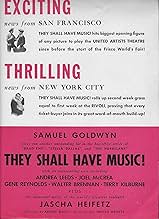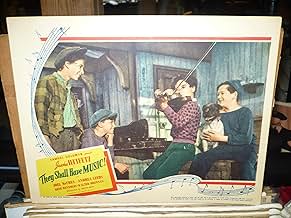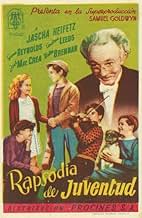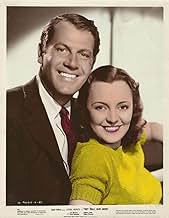IMDb RATING
6.9/10
563
YOUR RATING
A boy runs away from home and ends up at a music school for poor children. When the school suffers hard times, he enlists the aid of violinist Heifetz to save the day.A boy runs away from home and ends up at a music school for poor children. When the school suffers hard times, he enlists the aid of violinist Heifetz to save the day.A boy runs away from home and ends up at a music school for poor children. When the school suffers hard times, he enlists the aid of violinist Heifetz to save the day.
- Nominated for 1 Oscar
- 3 wins & 1 nomination total
Gale Sherwood
- Betty
- (as Jacqueline Nash)
Alexander Schoenberg
- Menken
- (as Alexander Schonberg)
- Director
- Writers
- All cast & crew
- Production, box office & more at IMDbPro
Featured reviews
They Shall Have Music from 1939 stars violinist Jascha Heifetz as himself, Joel McCrea, Gene Reynolds, Walter Brennan, Marjorie Main, and a favorite performer of mine, Zero the Dog. Directed by Archie Mayo.
The basic story concerns a boy (Reynolds) who runs away from home and winds up in a music school for kids. Gifted musically, he attempts to help the school stay open by appealing to Heifetz.
The star, of course, is Heifetz' magnificent playing. Though the film states he plays a Stradivarius, that violin name was thought to be more recognizable to audiences than his actual instrument, a Guarnarius. How wonderful to have Heifetz' gorgeous work on film.
If you like opera, you haven't lived until you've heard nine-year-old Gale Sherwood singing Caro Nome. I know hearing a child squeak out the coloratura was a life-changing experience for me.
In fact, Gale Sherwood grew up to be a lovely soprano who made films, did a nightclub act with Nelson Eddy, performed The Desert Song on tv, and Showboat at the LA Music Center. Then she moved to Florida and retired. She can be heard as an adult on YouTube.
I saw Zero the Dog in High Sierra. His role on that film was a tad more dramatic, but he was a delightful thespian and did a great job in this.
The basic story concerns a boy (Reynolds) who runs away from home and winds up in a music school for kids. Gifted musically, he attempts to help the school stay open by appealing to Heifetz.
The star, of course, is Heifetz' magnificent playing. Though the film states he plays a Stradivarius, that violin name was thought to be more recognizable to audiences than his actual instrument, a Guarnarius. How wonderful to have Heifetz' gorgeous work on film.
If you like opera, you haven't lived until you've heard nine-year-old Gale Sherwood singing Caro Nome. I know hearing a child squeak out the coloratura was a life-changing experience for me.
In fact, Gale Sherwood grew up to be a lovely soprano who made films, did a nightclub act with Nelson Eddy, performed The Desert Song on tv, and Showboat at the LA Music Center. Then she moved to Florida and retired. She can be heard as an adult on YouTube.
I saw Zero the Dog in High Sierra. His role on that film was a tad more dramatic, but he was a delightful thespian and did a great job in this.
I think Samuel Goldwyn was trying to accomplish two things in this film. First the film is a homage to Jascha Heifetz, considered to be the best violin virtuoso of the past century. Secondly having brought to the screen the Dead End kids with his film of the same title and seeing them sign with Warner Brothers, he was trying to create a second gang of appealing urchins.
Though the film was good there certainly was no demand that the kids from this film be reteamed for another feature.
Leader of the gang is Gene Reynolds who at one time played the violin, but now leads a street gang of disreputable urchins. His stepfather, Arthur Hohl, breaks the violin his late father gave young Reynolds and threatens to send him to reform school over the feeble protests of his mother Marjorie Main.
Young Reynolds happens to stumble onto a music school run by the old music maestro himself, Walter Brennan and his daughter Andrea Leeds. They take him in, but they have their financial problems with a lot of creditors led by Porter Hall.
This film is mostly to be seen today because it's a chance for classical music lovers to see and hear Jascha Heifetz who as you gather is the solution one way or another to everybody's problems. Joel McCrea is in this film also, but has a rather colorless part as Andrea Leeds boyfriend.
Besides Heifetz, one thing the film does do is touch on, albeit gingerly on the topic of child abuse and battered spouses. Arthur Hohl is one mean man and Marjorie Main is very clearly a much battered wife.
The kids in the cast do well, Reynolds, Tommy Kelly, Terry Kilburn and a young girl under the name of Jacqueline Nash who grew up and performed as Gale Sherwood, nightclub partner to Nelson Eddy. She had a nice soprano even as a child.
But it's Heifetz you see the show for.
Though the film was good there certainly was no demand that the kids from this film be reteamed for another feature.
Leader of the gang is Gene Reynolds who at one time played the violin, but now leads a street gang of disreputable urchins. His stepfather, Arthur Hohl, breaks the violin his late father gave young Reynolds and threatens to send him to reform school over the feeble protests of his mother Marjorie Main.
Young Reynolds happens to stumble onto a music school run by the old music maestro himself, Walter Brennan and his daughter Andrea Leeds. They take him in, but they have their financial problems with a lot of creditors led by Porter Hall.
This film is mostly to be seen today because it's a chance for classical music lovers to see and hear Jascha Heifetz who as you gather is the solution one way or another to everybody's problems. Joel McCrea is in this film also, but has a rather colorless part as Andrea Leeds boyfriend.
Besides Heifetz, one thing the film does do is touch on, albeit gingerly on the topic of child abuse and battered spouses. Arthur Hohl is one mean man and Marjorie Main is very clearly a much battered wife.
The kids in the cast do well, Reynolds, Tommy Kelly, Terry Kilburn and a young girl under the name of Jacqueline Nash who grew up and performed as Gale Sherwood, nightclub partner to Nelson Eddy. She had a nice soprano even as a child.
But it's Heifetz you see the show for.
This is a remarkable and wonderful film. In 1939, the classical violinist Jascha Heifetz (generally regarded by common consent in the classical music world as the greatest violinist of the 20th century, which is certainly my view) was actually a popular icon in America. So far have cultural standards declined that such a thing would be impossible to imagine today, in a world contaminated by Madonnas and Kylies and other such low life characters who prance around showing off their tits and bottoms and think of themselves as 'musicians'. And so Samuel Goldwyn decided to make a whole feature film around Heifetz, admirably directed by Archie Mayo. The story is first rate, and Heifetz is portrayed as a stratospheric and inaccessible concert star who happens to run into a poor kid in New York, through a series of amusing circumstances, and thereby becomes involved with the fate of a music school for disadvantaged urban children. The school is continually threatened with closure through lack of funds, but no one dares tell the idealistic head of the school, played by the endearing Walter Brennan, that there are drastic debts owing and angry creditors at the door. In one hair-raising scene, a ruthless music instrument supplier has removal men seize all the instruments from the children of the school's orchestra when they are in the middle of a concert. Joel McCrea is very good as the cheerful beau of Brennan's daughter, sympathetically played by Andrea Leeds, who cheerfully loses his job in order to help support the school and the cause of encouraging poor children to learn music. The star of the film is Gene Reynolds, who plays the poor boy Frankie at the centre of the story who enters the school because he has perfect pitch (or 'a good ear', as Brennan modestly puts it). Reynolds is admirably supported by one of the finest canine actors of the period, a little dog called Zero, who plays the character Sucker, a dog who is Frankie's inseparable companion. Child actor Terry Kilburn is also extremely good as Frankie's younger friend Limey, so named because he is British and sounds it. He is such a cheerful little chap. This film was entitled RAGGED ANGELS in a re-release at a later date in America, but in Britain was called MELODY OF YOUTH. Jascha Heifetz plays numerous extended virtuoso pieces in this film, such as RONDO CAPRICCIOSO by Camille Saint-Saens. No trouble is spared to film him from every angle, with plenteous close-ups of his fingers, his bowing technique, and views of him of every description. He also speaks and briefly 'acts' in a few scenes. From the point of view of the history of music and the violin, this film is a 'must-see' because of the extensive coverage given to Heifetz, around whom the whole film revolves. It was the first time he had appeared in a film. As all who have ever seen archive film of him playing know, Heifetz showed absolutely no emotion when he played, but while remaining as formal as a Greek statue, he could wring more emotion out of his violin than anyone since Paganini, and more than anyone since. He was simply the greatest. And what a treasure this film is, to contain such an early record of his performing. As for the film itself, it is charming and delightful, and most entertaining. It is most emphatically not just a story strung carelessly together to provide an excuse for getting Heifetz on screen. In fact, it is a pity that young people interested in music today cannot all be shown this film in school. I would recommend most strongly to any parents with a child serious about classical music that they show this film to the child. It also carries an important message about the power of music to uplift those who are in unfortunate circumstances and in great poverty. The scene where the mothers of the children block the entrance to the school to stop the men coming in to seize the instruments is touching testimony to how hard times produce backbone and determination. The social lesson is the need to spread classical music more widely through all levels of society. After all, it is such a civilising influence, and there are not many civilising influences left, are there? Isn't it better to be taught to play an instrument and to take part in a student orchestra than to sit at home playing computer games in which you kill people until you are so brutalised that you then pick up a gun from your father's gun cabinet yourself and carry out one of those school massacres? All of those student atrocities I blame on the parents, by the way, since the kids who carry them out are always the spoilt brats of spineless affluent upper middle class families, whose parents should be locked up as incompetents and enablers of their psychopathic offspring. Anyone in search of a bit of sanity in a world full of bad parents and vicious spoilt kids should watch this film, to remember that there was an innocent time when the worst entertainment to which children used to be exposed was likely to be the insipid charms of cowboy heroes like Gene Autrey and Roy Rogers, or perhaps a highly unconvincing monster from outer space invading the earth. Today all the monsters are here already, and do not need to be imported from other worlds. The 'other world' of today is the world of yesterday.
You may have heard that music is the universal language. Nowhere is that more true than in Archie Mayo's "They Shall Have Music". It focuses on a troubled boy who runs away from home and joins a struggling music school. Things take a turn when Jascha Heifetz (playing himself) enters the scene.
The movie addresses poverty and funding for the arts. And in the process, we get to hear some masterful performances of works by the great composers (and of course, during the Barber of Seville overture, I pictured Bugs Bunny subjecting Elmer Fudd to all sorts of humiliation to the tune of the overture). No surprise that the children perform the music exquisitely, since Samuel Goldwyn hired the Meremblum Orchestra to star in the movie.
It might not be the greatest movie ever made, but I hope that it reminds people of the importance of the arts. Indeed, during WWII, Winston Churchill got asked if he planned to cut funding for the arts to redirect the money to the armed forces, and he said "Then what are we fighting for?" Alfred Newman's Academy Award-nominated score is like a character by itself. I definitely recommend this movie.
The movie addresses poverty and funding for the arts. And in the process, we get to hear some masterful performances of works by the great composers (and of course, during the Barber of Seville overture, I pictured Bugs Bunny subjecting Elmer Fudd to all sorts of humiliation to the tune of the overture). No surprise that the children perform the music exquisitely, since Samuel Goldwyn hired the Meremblum Orchestra to star in the movie.
It might not be the greatest movie ever made, but I hope that it reminds people of the importance of the arts. Indeed, during WWII, Winston Churchill got asked if he planned to cut funding for the arts to redirect the money to the armed forces, and he said "Then what are we fighting for?" Alfred Newman's Academy Award-nominated score is like a character by itself. I definitely recommend this movie.
A bright youngster interested in "serious" music (admittedly a vanishing breed--who'll play the fiddle when no one can play the violin??"--could find this an interesting fiction about street kids and great musical stars. Heifitz was indeed the greatest violinist of his generation and the film gives him a rare on-screen chance to display his technique. The kids, especially Gene Reynolds, are fine and, all in all, the pic is a good example of first-rate studio family fare of the late 30's. It doesn't hit the top of the great '39 list, but it's a nice way for an intelligent family to spend a rainy afternoon with AMC or the Video Store--- good luck at Blockbuster!!!!
Did you know
- TriviaIn the movie, the newspaper account lists Jascha Heifetz's stolen violin as a Stradivarius. Heifetz used a Guarnarius in the picture and favored that violin in real life, but the producers felt that the name of Stradivarius would be more recognizable.
- GoofsThroughout the picture, the kids in the orchestra are caught looking into the camera or eyeing it sideways, licking their lips, fidgeting, etc.
- SoundtracksAndante cantabile
from "String Quartet No.1 in D, Op.11" (1871) (uncredited)
Written by Pyotr Ilyich Tchaikovsky
In the score during the opening credits
Reprised a bit by Gene Reynolds (violin)
- How long is They Shall Have Music?Powered by Alexa
Details
- Release date
- Country of origin
- Language
- Also known as
- Rapsodia de juventud
- Filming locations
- Production company
- See more company credits at IMDbPro
- Runtime1 hour 42 minutes
- Color
- Aspect ratio
- 1.37 : 1
Contribute to this page
Suggest an edit or add missing content

Top Gap
By what name was Mélodie de la jeunesse (1939) officially released in India in English?
Answer






















